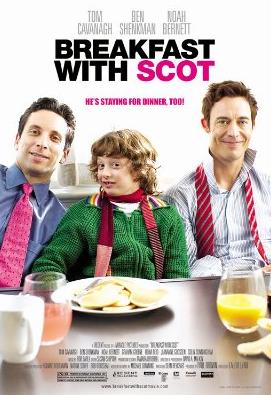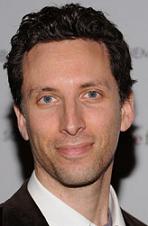
Main Page
Interviews Menu
Alphabetical Menu
Chronological Menu


In Breakfast with Scot, directed by Laurie Lynd, Ben Shenkman plays Sam, a sports lawyer who, together with his boyfriend, Eric (Tom Cavanagh), takes care of Scot (Noah Bernett), the 11-year-old son of his brother's dead ex-girlfriend. Scot struggles to make friends and be accepted while unashamed of his girliness. Eric, a former hockey player, prefers that he would supress his girly, flamboyant behavior and signs him up to play hockey. Ben Shenkman has previously had smaller roles in Then She Found Me, Just Like Heaven, Must Love Dogs, Pi, Eraser and Quiz Show. He also performed in the Broadway show "Proof" and in the TV series "Law and Order". It was a real privilege to interview him. Regent Releasing opens Breakfast with Scot on October 10th, 2008 at the Quad Cinema. NYC MOVIE GURU: Whatís the significance of the word ďbreakfastĒ in the title Breakfast with Scot? BEN SHENKMAN: Iím not sure about that, but itís possible that itís a reference to Breakfast at Tiffanyís, which is in some ways a sort of cultural, gay touchstone. Thatís the way that I read it. [Also], breakfast is kind of a family thing. For lunch and dinner, you go out into the world and encounter other people, but who you have breakfast with is who you wake up with, which means thatís who your family is. Thatís a shorthand of saying that a new family is being made in Breakfast with Scot. NYC MOVIE GURU: What appealed to you about screenplay of Breakfast with Scot? BEN SHENKMAN: I liked how gentle and genuinely sweet the [screenplay] was because you can easily approach this territory with easy snarkiness and I thought itís a little bit trickier to do it in a more open-hearted way. I trusted that the jokes are there and that the movie wonít be snorted at by a sophisticated audience. Itís nice to see a movie thatís not treacle and over-sentimental, but that it does comes from a real sense of vulnerability of being that age. It allowed you to understand the adults who themselves feel vulnerable just by being around whoís that age and going through that. NYC MOVIE GURU: How did you know to trust director Laurie Lynd? What impressed you the most about him? BEN SHENKMAN: You donít know and yet you simply do trust. You have to trust no matter who youíre working with because often people who are very experienced will go down the wrong path. So, each time you step out into something with people, you just trust that everyone is doing their best job. In this case, it felt easier to trust him because he understood the material so well and his inherent personality wasnít [egotistical]. He was great at listening to other people and also able to be perfectly firm about his choices, so that inspires confidence. For a director of a three-week shoot, to get a feature in the can, I found him exceptionally relaxed. NYC MOVIE GURU: Did you read the book before signing on to be in the film? BEN SHENKMAN: No, I never read the book. I know just from knowing the filmmakers where it departs from the book. I know that the book was successful and our producers and directors loved the book, which is why they made it [into a movie]. NYC MOVIE GURU: How do you work with kid actors such as Noah Bernett? BEN SHENKMAN: The trick is that you have to work with them just like you work with a grown-up actor which is to find a way to enjoy each otherís company because thereís a lot of time when youíre not working and waiting for other people. Often, when people work with kids, what they wind up doing is over-rehearsing them, so they wind up drilling the performance into the kid. What kids are better at doing than adults is allowing the performance spontaneously in front of the camera. Both Tom and I kept an eye on that and kept reminding him that itís perfectly okay to throw away whatever the rehearsed little thing was. Sure enough, once he sensed that, he would get better and better. NYC MOVIE GURU: How did you bond with Noah Bernett offset to make him feel more comfortable? BEN SHENKMAN: We did have rehearsals, but itís not like you have to design a rehearsal in order to bond and make him comfortable. Itís simply that in the course of spending time together, you become comfortable which is the same with any other actor. One of the things that happens in movies is that you often donít have a lot of rehearsal and you often donít have a lot of time to create a relationship with somebody that you need to have a deep relationship with onscreen. On the other hand, in Breakfast with Scot, itís a new relationship and itís not until the end of the movie that those characters become fully comfortable anyway. Itís not like when you meet a child actor thatís supposed to be your child for all your life, so thereís not that much distance to cover. NYC MOVIE GURU: What kind of experience have you had when it comes to taking care of a child? BEN SHENKMAN: It was very little when we made the movie and now Iím a new parent of a 6-weeks-old [baby]. Thatís very different than inheriting a fully formed 11-year-old. I intuited some things about parenthood such as that itís easy to worry about your kid inheriting some part of you that you are not resolved and comfortable with. The funny thing about being a parent is that someone who feels invisible is made as vulnerable as the child they care about. Thatís where the joke is and where the pathos is. NYC MOVIE GURU: How has your experience as actor in theater prepared you for acting in films? BEN SHENKMAN: Itís in theater that you learn how a story functions in real time. Youíre telling a story from beginning to end in two hours and you are present with the audience as you get that story and youíre responsible for delivering it in the way that it will work for them. Youíre [also] responsible for being aware of that while youíre doing it. If you learn to act in film, youíre able to be unaware of how the whole thing orchestrates and works together for the audience. [Instead], you just contribute your little piece and it gets taken away and put together by somebody else who has to be aware of that. NYC MOVIE GURU: How did the characters Sam and Eric originally meet? BEN SHENKMAN: The fact that Ericís a hockey player is just for the movie; it doesnít come from the book. Thereís a scene when Eric is talking to Scot and he says something like, ďWell, I got hurt and Sam took care of me.Ē The idea was that Sam was the sports lawyer, the teamís lawyer, and, so when Eric got hurt, whatever legal issues were involved in creating a retirement or pension for Eric was part of Samís job. Thatís how they met and how the relationship came about. NYC MOVIE GURU: What question do you have in your mind to ask about Scot as he grows older? BEN SHENKMAN: One of the [questions] that comes up is, ďIs Scot really gay?Ē and what does it mean to talk about being gay when youíre pre-sexual. I intuit that kids are gay from an early age and that thereís no such thing as pre-sexual. Even young kids are sexual even though they donít act on their sexual impulses. I believe that if youíre gay, youíre 4 or 5-years-old and having crushes on male figures in the same way that a straight person has a crush on females from an early age. NYC MOVIE GURU: How do people change the way theyíre judgmental about others as they grow older? BEN SHENKMAN: They learn the social graces of keeping their opinions about people private. As you see, when the stakes get high and people get agitated, the same attitudes tend to come up. Look at electoral politics, for example. Look at the way the media covers politics, [which] isnít that far away from a schoolyard. I donít know if people change that much. To some extent, the movieís about people who have worked very hard to make themselves feel normal after not to feeling normal as kids, so that the idea of being presented with a kid who has not inclination or ability to try to be normal is what makes them all agitated. In a way, the kid is a couple of steps ahead of them. NYC MOVIE GURU: Have you experienced any kind of alienation as a child? BEN SHENKMAN: Not in a dramatic way as in the movie. Being a girly boy is a very marking thing. If thatís your story, thatís a very ostentatious and particular way of feeling ďotherĒ. In smaller ways, almost everybody feels moments of ďothernessĒ or alienation in different ways. [They] consciously or subconsciously have to choose certain things in order to stay safely out of that territory. [However], sissy kids canít cover it up and blend in, so they have to face all that stuff. Main Page Interviews Menu Alphabetical Menu Chronological Menu ______________________________________________________ |
The NYC Movie Guru
themovieguru101@yahoo.com
Privacy Policy